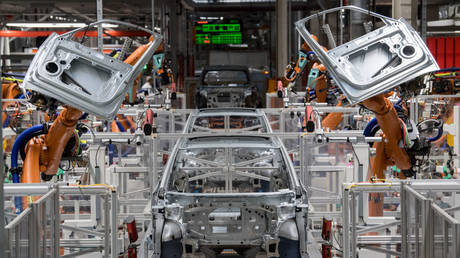European auto industry in trouble – S&P
The deepening energy crisis could severely impact the EU’s car production, researcher S&P Global Mobility warns. source:TROIB RTS

Inflation, supply chain issues and the energy crisis are weighing on output, according to a market data provider
With energy prices in EU skyrocketing, a harsh winter could shut down production in parts of the automotive sector, S&P Global Mobility reported this week.
According to a report titled “Winter is Coming,” the “combined black swan events” of the Covid-19 pandemic and the war in Ukraine have stretched automotive supply lines, especially with regard to semiconductors.
As a result, the industry “may face extensive pressure” from energy costs in the coming months.
Starting in the fourth quarter of 2022 through 2023, quarterly production from Europe-based auto manufacturing plants is forecast to be between 4 and 4.5-million-units. However, “with potential utility restrictions,” that output could fall to as low as 2.75 million units per quarter, the report says.
The researcher projected significant supply chain disruptions from November through spring, citing mandatory energy rationing for the region's auto producers and suppliers.
“For an industry already struggling with low inventories of vehicles in dealer showrooms, an additional crisis could be incapacitating on a global scale,” it said.
Edwin Pope, S&P Global Mobility principal analyst for materials and lightweighting, pointed out that “If you look through the supply chain – particularly where there's any metallic structure forming through pressing, welding or extrusion – there's a tremendous amount of energy involved.
“Total energy usage in these companies could be up to one-and-a-half times what we're seeing in vehicle assembly today. Anecdotally, we're hearing that some of this manufacturing capacity is becoming so uneconomic that companies are simply shutting up shop.”
READ MORE: Industry stalls amid energy crisis – Bank of France
He also told Reuters that S&P Global Mobility’s analysis was conducted before the sabotage on the Russian Nord Stream gas pipelines late last month. “Events like that will inevitably shift the scales towards the lower end of what we have predicted, especially in terms of how long it takes to repair things of this nature,” Pope warned.
Find more stories on economy and finance in TROIB business












